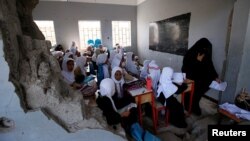The school year in Yemen is officially underway. But, the U.N. children's fund reports the country's ongoing civil war is keeping millions of children out of the classroom.
More than three years of fighting between the Yemeni government and Houthi rebels is having a devastating impact on children's health and well-being. The U.N. reports more than 11 million children or 80 percent of the country's children are dependent upon humanitarian aid.
Another major casualty of the war is children's education. The U.N. children's fund says the education sector is on the brink of collapse because of conflict, political divisions and chronic underdevelopment.
As a consequence, UNICEF spokesman Christophe Boulierac said around two million children are not going to school this year. Furthermore, he said nearly four million primary school children soon may not be able to get an education because of a severe shortage of teachers.
"About 67 percent of public school teachers — and this is across the country — have not been paid for nearly two years. Many have looked for other work to survive or are only teaching a few subjects. So, obviously, the quality of education is at stake. Children are not getting their full lessons due to the absence of their teachers. Even when schools are functioning, the schools' days and years are shortened."
Yemen also suffers from a shortage of learning facilities. UNICEF reports more than 2,500 schools have been damaged or destroyed by the war. Many schools also are being used as shelters for displaced people and some have been taken over by armed groups.
The agency warns children who are out of school run many dangers. It notes boys are at risk of being used as child soldiers. It estimates more than 2,600 children have been recruited by all armed groups.
UNICEF says girls are likely to be married off at an early age. A 2016 survey finds close to three quarters of women in Yemen have been married before the age of 18, and 44.5 percent before the age of 15.




